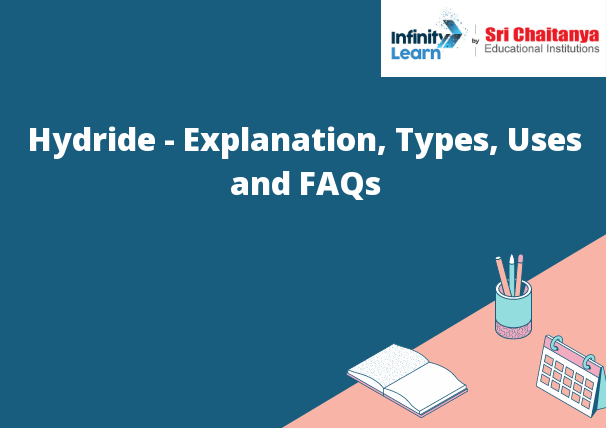Table of Contents
Introduction to Hydride
Hydride – Explanation: A hydride ion is an anion composed of a hydrogen atom and a negative charge. It is formed when a hydrogen atom loses one electron, and it has the symbol H- . The hydride ion is very reactive and can form strong bonds with many metals. A hydride is a compound consisting of hydrogen and another element. The simplest hydride is hydrogen gas, which is composed of one atom of hydrogen and no other elements. Other hydrides, such as metal hydrides, are composed of hydrogen and a metal.
Hydrides are important in chemistry because they can be used to store and transport hydrogen. Metal hydrides can be used to store hydrogen gas in a solid form. This is important because hydrogen gas is difficult to store and transport in a liquid form.

Hydrides
- Hydrides are compounds of hydrogen and another element. The simplest hydride is hydrogen gas, which is made up of one atom of hydrogen. Some other examples of hydrides include sodium hydride, which is made up of one atom of sodium and one atom of hydrogen, and magnesium hydride, which is made up of one atom of magnesium and one atom of hydrogen.
- Hydrides are compounds of hydrogen and another element. The simplest hydride is hydrogen gas, which is made up of one atom of hydrogen. Some other examples of hydrides include sodium hydride, which is made up of one atom of sodium and one atom of hydrogen, and magnesium hydride, which is made up of one atom of magnesium and one atom of hydrogen.
- Hydrides are compounds that contain hydrogen and another element. The simplest hydride is hydrogen gas, which is made up of one atom of hydrogen. Some other examples of hydrides include sodium hydride, which is made up of one atom of sodium and one atom of hydrogen, and magnesium hydride, which is made up of one atom of magnesium and one atom of hydrogen.
The Different Types of Hydrides
- There are many different types of hydrides, but they all share one common trait: they contain hydrogen atoms bonded to other elements. The nature of the bond between the hydrogen and the other element can vary, which leads to different types of hydrides.
- The simplest type of hydride is an ionic hydride, in which the hydrogen atom is bonded to a metal atom. This type of hydride is very unstable and tends to decompose quickly.
- Another type of hydride is a covalent hydride, in which the hydrogen atom is bonded to another atom via a covalent bond. This type of hydride is generally more stable than the ionic hydride.
- There are also a number of organohybrides, which are hydrides that contain carbon atoms bonded to hydrogen atoms. These molecules can be very unstable and reactive.
The Uses of Hydrides
There are many uses of hydrides. Some common uses are as follows:
- As a source of hydrogen gas.
- In the production of metals, such as aluminum and magnesium.
- As a desiccant.
- In the production of plastics.
- In the production of pharmaceuticals.
- In the production of fertilizers.
- As a fuel additive.
FAQs Hydride
1. What is hydride?
A hydride is a compound of hydrogen with another element or radical.
2. What are the different types of hydrides?
The different types of hydrides are ionic hydrides, covalent hydrides, and metallic hydrides.
3. What is an ionic hydride?
An ionic hydride is a compound of hydrogen with a metal.
4. What is a covalent hydride?
A covalent hydride is a compound of hydrogen with a nonmetal.
5. What is a metallic hydride?
A metallic hydride is a compound of hydrogen with a metal.
6. What are the properties of ionic hydrides?
Ionic hydrides are brittle and have high melting points. They are also very reactive and can explosively decompose.
7. What are the properties of covalent hydrides?
Covalent hydrides are typically gases or very weak liquids. They are not very reactive and do not explosively decompose.
8. What are the properties of metallic hydrides?
Metallic hydrides are typically solids with low melting points. They are not very reactive and do not explosively decompose.







